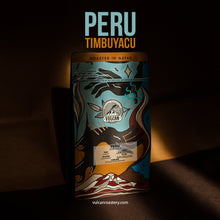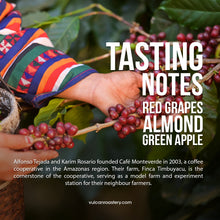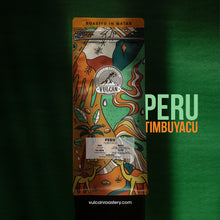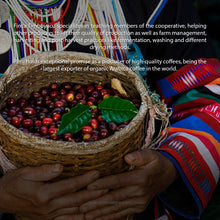
PERU - TIMBUYACU
Husband and wife duo, Alfonso Tejada Iberico & Karim Rosario Araoz Grandez, founded Café Monteverde in 2003, a coffee cooperative in the Amazonas region.
VARIETAL: Bourbon, Catimor, Catuai, Caturra, Maragogype, Pache
PROCESSING: Anaerobic Honey
ALTITUDE: 1,620 meters above sea level
PRODUCER: Alfonso Tejada Iberico & Karim Rosario Araoz Grandez
REGION: Amazonas
TASTING NOTES: Red Grapes, Almond, Green Apple

Finca Timbuyacu, is the cornerstone of the cooperative, serving as a model farm, experiment station and more.
ABOUT THE PRODUCERS
Alfonso Tejada Iberico inherited Finca Timbuyacu from his mother, who inherited it in turn from her own mother, Eleodora Mori de Ibérico. Eleodora has been a source of inspiration for Alfonso his wife,
Karim Rosario Araoz Grandez. The farm’s name comes from a story Eleodora used to tell Alfonso about a spring on the farm that had so much water, the water spat from the spring as if were boiling. The name Timbuyacu comes from the Quecha words timbu meaning boiling and yacu meaning water. In order to continue his grandmother’s legacy,
Alfonso and Karim began their “Nueva Esperanza” project in 2010 when they sold their Lima-based travel agency in order to return to Finca Timbuyacu and establish a model farm. Under their care, Finca Timbuyacu became the heart of Cafe Monteverde’s efforts. The pair were committed to improving social conditions for other small producers in the region, and they envisaged the business as a means of helping producers in the region to market their coffee in better conditions.
Perhaps most significant is the role Finca Timbuyacu plays as a model farm. Members can visit to learn about farm management and harvesting as well as post-harvest practices like fermentation, washing and different drying methods. Finca Timbuyacu specializes in teaching members a variety of skills that will lift their quality of production to the highest levels possible.
CULTIVATION
When they first planted coffee trees at Timbuyacu, everyone told them nothing would grow. They were warned that the land was not fertile and their yield would never been significant. However, under their tender care, their harvest and coffee quality has increased each year. Timbuyacu’s coffee took home 12th place in the 2017 Cup of Excellence.
Of Finca Timbuyacu’s 68 hectares, 38 hectares are devoted to forest preserves that protect native plant and wildlife species. The conservation areas alsobprotect the farm’s lake and natural stream by providing a natural barrier to slow erosion and prevent pollution.
Alfonso’s grandmother, Eleodora, grew coffee, yuca, corn, bananas, sugarcane, pineapple, beans and various other fruit trees on the land. She erected stone piles (Pilancones) to mark the divisions between crops. These pilancones are still part of the
farm’s landscape today. Before she died, Eleodora distributed the land among her children, including Alfonso’s mother. Today, Alfonso and Karim also grow yuca, bananas, beans, vegetables, orange and pineapples.

HARVEST & POST-HARVEST
Cherry is selectively handpicked and then placed in airtight containers where it ferments anaerobically for 18 hours. Then, cherry is pulped and placed in Ecotact bags to ferment anaerobically for 24 hours.
Parchment and remaining mucilage is then laid in thin layers on drying beds and patios. Coffee is turned frequently to ensure even drying.
ABOUT CAFÉ MONTEVERDE
Café Monteverde establishes relationships with a wide range of producers and producer organizations. In addition to producing a range of their own microlots from Finca Timbuyacu, Alfonso and Karim focus on providing a range of services for producermembers and helping market their coffee. Monteverde helps member farms take steps to ensure good soil management and conservation.
Members plant living barriers and diverse shade trees, and add contour lines to reduce erosion. Araoz and Tejada also take an active role in the communities of their producers. In 2010, the organization collectively purchased a playground for children in one producer community. Then, in 2014, they purchased 40 new mattresses for children whose sleeping conditions were substandard.
Since it was founded, Café Monteverde has been establishing relationships with a wide range of producers and producer organizations. In addition to producing a range of their own micro-lots from Finca Timbuyacu, the cooperative also markets group lots and provides a range of services for the producers with whom they work. Monteverde helps member farms take steps to ensure good soil management and conservation.
Members plant living barriers and diverse shade trees and add contour lines to reduce erosion. Araoz and Tejada are also taking an active role in the communities of their producers. In 2010, the organisation collectively purchased a playground for children in one producer community. Then, in 2014, they purchased 40 new mattresses for children whose sleeping conditions were substandard.

COFFEE IN PERU
Peru holds exceptional promise as a producer of high-quality coffees. The country is the largest exporter of organic Arabica coffee globally. With extremely high altitudes and fertile soils, the country’s smallholder farmers also produce some stunning specialty coffees.
Though coffee arrived in Peru in the 1700s, very little coffee was exported until the late 1800s. Until that point, most coffee produced in Peru was consumed locally. When coffee leaf rust hit Indonesia in the late 1800s, a country central to European coffee
imports at the time, Europeans began searching elsewhere for their fix. Peru was a perfect option.
Between the late 1800s and the first World War, European interests invested significant resources into coffee production in Peru. However, with the advent of the two World Wars, England and other European powers became weakened and took a less colonialist perspective. When the British and other European land owners left, their land was purchased by the government and redistributed to locals. The
Peruvian government repurchased the 2 million hectares previously granted to England and distributed the lands to thousands of local farmers. Many of these farmers later grew coffee on the lands they received.
Today, Peruvian coffee growers are overwhelmingly small scale. Farmers in Peru usually process their coffee on their own farms. Most coffee is Fully washed. Cherry is usually pulped, fermented and dried in the sun on raised beds or drying sheds.
Drying greenhouses and parabolic beds are becoming more common as farmers pivot towards specialty markets. After drying, coffee will then be sold in parchment to the cooperative. Producers who are not members of a cooperative will usually sell to a middleman.
Cooperative membership protects farmers greatly from exploitation and can make a huge difference to income from coffee. Nonetheless, currently only around 15-25% of smallholder farmers have joined a coop group.










